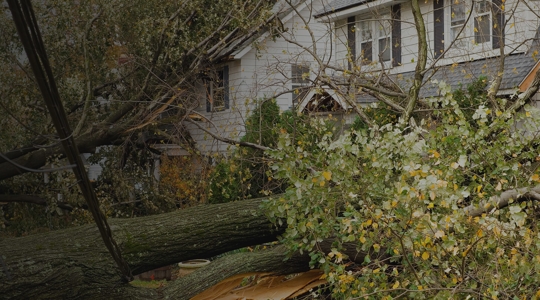Homeowners Insurance & Floods
Homeowners insurance policies do not cover flood damage, and very few commercial policies do. If a person wishes to insure their home or business against flooding, they’ll need to turn to policies offered by the National Flood Insurance Program (NFIP), run by the Federal Emergency Management Agency (FEMA). While these policies are federal, they are often sold by private insurance agents. In some areas, flood insurance is available from private companies.
One of the most consistent issues homeowners experience because of the division between flood insurance and homeowner’s insurance is receiving fair coverage after a storm. Often, insurance companies refuse to cover water damage because they accuse it of being caused by flooding—something many policies don’t cover. Yet, during a powerful storm or hurricane, water from instances other than flooding can damage a home.
Water can be introduced into a home during a storm from:
- Torrential rains
- Strong winds
- Roof damage
- Broken windows
Often, insurance companies mislabel damage from wind and water as flood damage to try and avoid coverage. We're ready to help people experiencing this underhanded tactic.
Steps to Take After Flood Damage in Louisiana
Per the Louisiana Department of Insurance (LDI), claimants should follow these steps after flooding. While these actions don’t guarantee a successful claim, they do help a person ensure they’re doing every possible to provide their insurer with everything needed to handle their claim. Then, if insurance companies use delay tactics, they’ll be unable to blame the delay on anyone else.
The LDI suggests doing the following after a flood:
- Call your insurer and start the claims process. After filing your claim, an adjuster should get in contact with you within a few days.
- Document all damage caused by the flooding with pictures or video. Focus on damage to your property’s structure, floodwater levels, and damaged or discarded property.
- File a Proof of Loss. Doing this is required within 60 days of the flood. A Proof of Loss is a sworn statement that states the specific damage a person is claiming after a flood. If you’re uncomfortable with how this process is going, it’s important that you call an attorney as soon as possible so they can assist you before the 60-day limit passes.
About Lafayette, LA
Lafayette is a city in Louisiana that is located on the Vermilion River. It is the seat of Lafayette Parish and, as of July 2021, had an estimated population of 121,771. The area was settled by Acadians who were expelled from Canada after the Seven Years’ War in the late 1700s. It was first named Vermilionville and was incorporated as such in 1836, but the city was renamed in 1884 after General Lafayette, a French aristocrat who played an integral part in the American Revolutionary War.
Today, Lafayette is known for its strong Acadian roots. It has been recognized as the heart of Cajun and Creole Country and was named the Happiest City in America in 2014. In 2018, Forbes recognized Lafayette as one of the best places for careers and businesses. The city encompasses nearly 56 square miles of land on both sides of the Vermillion River and has an elevation that ranges from 36 to 49 feet above sea level.
Lafayette has a primarily humid subtropical climate and year-round precipitation, especially in the summer months. The city’s location on the Gulf Coast means it is also prone to severe weather. Lafayette is at risk of experiencing flooding and other damage from hurricanes, tropical storms, and tornadoes. A total of 1,236 extreme weather events were recorded within 50 miles of Lafayette from 1950 to 2010, including 82 tornadoes of a magnitude of F2 or greater on the Enhanced Fujita Scale. An article published by The Center Square in November 2021 discussed Lafayette’s risk of experiencing costly hurricane damage, ranking the Lafayette metropolitan area as 14th in the United States for hurricane risks to single-family homes.
Lafayette Links & Resources
Help Is Available from Our Louisiana Water & Flood Insurance Law Firm
While no home insurance and very few commercial policies cover flood damage, it’s important to remember one thing: water damage isn’t always caused by flooding, even if a flood impacted the area near your home. At Arnold & Itkin, our team is familiar with water and flood damage—distinguishing water from flood damage is part of what we do to help clients receive fair compensation. If you’ve made sure you’re protected from water damage and now your insurance company is refusing to cover your losses, our team is ready to help. We’re ready to investigate your claim and identify any bad faith practices that your insurer is utilizing. We’ve helped thousands of people in your position, and we know how uncertain this time can be.
Whether your damage was caused by a flood or water after a hurricane or other type of storm, call (888) 493-1629. Our Louisiana water and flood damage lawyers are ready to listen to your situation and help you decide what to do.
